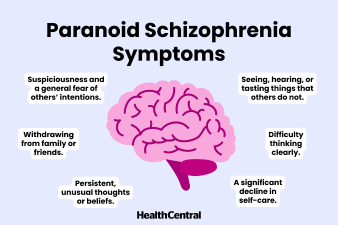Schizophrenia is a serious mental illness, in the sense of perception, thinking (thinking form disorder and thinking content disorder), emotion, will and behavior appear in different degrees of obstacles; professional medical treatment and drug intervention are required.


Early symptoms of schizophrenia
[1] Sensitive and suspicious: always feel that someone is targeting them, feel that they are being listened to or monitored, overly sensitive and suspicious.
[2] Sensory and perceptual disorders: auditory and visual hallucinations, memory, understanding, and logical thinking ability decline.
[3] Moody: the mood changes very fast, often because of small things angry.
[4] Abnormal language: speech is topsy turvy, lack of logic and coherence, voice changes or strange tone.
[5] Abnormal behavior: The appearance of incomprehensible thoughts or behaviors, such as the feeling that they have super powers.
Patients with schizophrenia in the early stages of illness, it is easy to be mistaken by others for a bad mood, bad temper, lazy life, backward thinking or introverted personality, so as to miss the best treatment time.
Features of schizophrenia
Schizophrenia is a neurochemical disorder associated with abnormal levels of neurotransmitters (such as dopamine) in the brain, which can lead to hallucinations, delusions and other symptoms.
It is not just a mental disorder, but can also affect the physical health and lifestyle of the sufferer.
The treatment of schizophrenia
Medication:
Antipsychotic medications are the treatment of choice for schizophrenia and can help reduce symptoms, control hallucinations and delusions, among others, and reduce the risk of relapse. Drug therapy should be systematic and standardized, emphasizing early, sufficient and full treatment.
There are two main categories of antipsychotics: typical antipsychotics and atypical antipsychotics.
- Typical antipsychotic drugs
Typical antipsychotic drugs include: chlorproazine (Thorazine), fluphenazine (Prolixin), Haldol (Haloperidol), Loxitane (Loxitane), Perphenazon (Trilafon), Navane (Navane), triflurazine (Stelazine), etc.
While they help manage your symptoms, antipsychotics come with a variety of side effects of their own. Managing the side effects of these medications is another important part of treatment.
Some people experience mild side effects of typical antipsychotic drugs. These usually go away a few weeks after treatment starts, such as dry mouth, blurred vision, constipation, lethargy, dizziness, etc.
More serious side effects may include restlessness, muscle cramps or spasms, involuntary muscle twitching, etc. For example, you may unconsciously stick out your tongue, lick your lips, or wave your arms, which is called tardive dyskinesia.
Some side effects can be difficult to manage, but it's important to talk to your primary doctor about your condition and get his advice before stopping or changing medications. Because there is a high risk of recurrence after stopping the drug without authorization. You and your primary care provider can work together to find an effective solution.
- Atypical antipsychotic drugs
Atypical antipsychotics include: Aripiprazole (Abilify), Asenapine (Saphris), Clozaril (Clozaril), iperidone (Fanapt), Lurasidone (Latuda), Olanzapine (Zyprexa), Paliperidone (Invega), risperidone (Risperdal), quetiapine (Seroque l), Ziprasidone (Geodon), etc.
These drugs are unlikely to cause "tartaric dyskinesia" but they may have different side effects, such as: weight gain, type 2 diabetes, sexual dysfunction, lethargy or paralysis, irregular heart rate, etc.
Some experts say that changing your diet and exercise habits, and sometimes taking extra medications, can reduce the risk of these side effects.
- Long-acting injections
Schizophrenia medications generally come in two common forms: "oral (pills, tablets, capsules, etc.)" or "long-acting injections (LAI)."
LAI is often used with atypical antipsychotics, and you can get an injection of LAI every few weeks or months. Some patients may prefer this option because this form is more suitable for patients with poor treatment compliance, weak home monitoring or no monitoring.
Psychotherapy:
Psychotherapy also plays an important role in the treatment of schizophrenia. It can help patients understand and manage symptoms and improve daily functioning. Cognitive behavior therapy, individual psychotherapy, family therapy and so on are commonly used psychotherapy methods.
- Cognitive behavioral therapy (CBT) : It can help you develop coping strategies for symptoms that medications can't address. CBT can also help you identify and achieve goals in therapy and in your daily life.
- Acceptance and Commitment therapy: It aims to improve the quality of your life by helping you accept and "make peace" with your symptoms. It's based on mindfulness. For example, you can learn to accept the symptoms of hearing voices by being open, curious, accepting, and neutral.
- Cognitive Enhancement Therapy (CET) : Use brain training games and group therapy to help you gain confidence in your cognitive abilities. The National Alliance for Mental Health (NAMI) notes that this is currently an active area of research.
- Family therapy: Encourage loved ones to hold family meetings when a problem arises, so that everyone can discuss the problem, list ways to solve it, and collaborate to find the best solution for everyone.
- Group therapy: This therapy can help you improve your social skills, work skills, relationships, and ability to stick to therapy. Group therapy can prevent you from feeling isolated and help with a reality rehearsal.
Social support:
The support of family, friends, and support professionals is essential for the recovery of people with schizophrenia. They can provide emotional support and help with daily difficulties.
Healthy lifestyle:
A healthy lifestyle such as exercising, eating a balanced diet, getting enough sleep, and avoiding drug and alcohol abuse can also contribute to recovery from schizophrenia.


